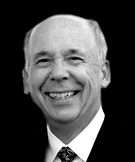Peter McGrath

"Too few of our bright students are pursuing careers in the sciences and engineering. When I was entering college the national attention and public pressure were on how we could catch up to and surpass the Russians in science and engineering."
In 1969, Dr. Peter McGrath began working and conducting research on nuclear energy in Karlsruhe , Germany . As he became internationally known for work on nuclear reactor safety and environmentally safe storage of radioactive wastes, he also hoped that one day nuclear energy would become the primary power source for industry and homes in the U.S. as it is in other European countries.
"I have always believed that nuclear power should have a prominent position in our installed electric generating capacity. Public acceptance has been a major hurdle to date. At present about 20% of our electricity is from nuclear, while in France it is about 75%. I don't see any reason why we could not do the same."
Dr. McGrath's concern about energy sources in the U.S. reflects a larger issue for him: the competitive position of the U.S. on an international scale, especially with regard to engineering students today. Having studied three languages, French, German, and Russian, Dr. McGrath believes that good engineering students must also be good leaders who have an international sensibility.
Currently, Dr. McGrath sees challenges to the U.S. maintaining its technology supremacy: "Too few of our bright students are pursuing careers in the sciences and engineering. When I was entering college the national attention and public pressure were on how we could catch up to and surpass the Russians in science and engineering."
Although Russia is no longer the main competitor, China and India now are, and the skills students need to acquire to make them globally competitive, according to Dr. McGrath, go beyond the classroom. He advises students to use to the fullest extent possible the activities college life offers: "Get out of the library and the classroom and participate. While GPA is important, it should not be the sole focus. Participation in college activities will help develop vital skills to be successful in any career, including engineering. Spend time learning to write and speak in public forums."
When Dr. McGrath attended San José State University , graduating in Mechanical Engineering in 1965, he not only excelled academically but was also involved in many extracurricular organizations that honed his leadership skills. He served as Sophomore Class President, Junior and Senior Class Representative to the Student Council, and as a member on several student-faculty committees. He was also a member of several leadership fraternities and an officer and member of Sigma Phi Epsilon.
Another invaluable resource Dr. McGrath credits are the mentors he had at San José State . There were three influential people, whom he vividly remembers to this day: Rod Diridon was his roommate of several years; his "advice and active pushing helped bring a raging introvert like me out of my shell."
Dean of Students Stanley Benz, whom Dr. McGrath got to know well through his involvement in student government, taught him how to negotiate non-technical problems, or, as Dr. McGrath puts it, "real-world problems."
Finally, Professor Robert Clothier went beyond his classroom responsibilities by encouraging Dr. McGrath to attend graduate school, helping locate financial support, and steering him to the field of nuclear engineering. His influence was profound, and Dr. McGrath earned his Ph.D. in Nuclear Engineering from the University of Wisconsin in 1969. "It was the friendship, advice and encouragement I received from these three people that prepared me for my career. To these people I am forever indebted."
Having earned numerous awards, Dr. McGrath is the former Senior Vice President of Science Applications International Corporation (SAIC). During his career, he has also worked at Sandia National Laboratories and the Environmental Protection Agency, and has served on the U.S. Nuclear Regulatory Commission.
Dr. McGrath's international technical and business expertise put him in an ideal position to assess the future. He believes the actions of individuals still matter and can have major impacts. "In hindsight, yesterday's problem or issue appears to have been easier to address, while those we are currently facing appear to be insurmountable. Either you set yourself to effect change or someone else or event will do it for you. I, personally, prefer to strive to influence my future rather than simply accept what comes along."